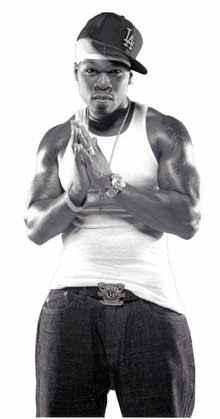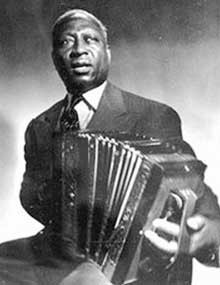The James Frey debate raises the question: What is authenticity in music, and does it matter?
Whether driven by a quest for genuineness in an image-driven culture or by the marketing jet stream, we’ve recently witnessed an explosion in verité entertainment: everything from amateur porn to amateur singers.
Memoirs have benefited, particularly redemptive autobiographies — the more harrowing the circumstances, the more inspirational their triumph. In the case of James Frey’s best-selling tale of addiction, A Million Little Pieces, the events of his life apparently required “embellishment” (his word), and possibly wholesale manufacture, according to a recent exposé. Of course, Frey’s publisher realized the story was more marketable if people believed it was true. (Blair Witch, anyone?)
| 50 Cent has confronted the issue of artistic legitimacy as did Josh White and Leadbelly before him. |
Though music doesn’t possess the same (apparently artificial) delineation between fiction and nonfiction, that hasn’t prevented authenticity from being an issue. From Ashlee Simpson’s Milli Vanilli moment on SNL to songwriting teams minting sk8tr gals to stage-side pitch-correction software, the industry has experienced its own crisis of credibility. The issue in music is tangled with different and evolving ideas of honesty, integrity, and originality. Is whether artists personally experienced what they sing about, adhere to genre conventions, or sell lots of records an appropriate yardstick?
“I grew up with singer-songwriters who were being ‘original,’ by which they meant they wrote songs like Joni Mitchell,” says Elijah Wald, author of books on blues artists Robert Johnson and Josh White. “What they meant by original was they had written the lyrics. To me they were breathtakingly un-original. But they had indeed written their own lyrics.”
The concept of authenticity in music goes back as far as Alan Lomax and the Smithsonian Folkways field recordings, according to Wald. “The perfect example for Lomax is Leadbelly and Josh White. Lomax used `White’s popularity` to bring in an audience for Leadbelly, but he felt that Leadbelly was the real thing and Josh wasn’t. Not that Josh wasn’t a real blues singer, but Lomax thought he was more vitiated by show biz.”
| Leadbelly |
To some extent, these are issues of canon, tied to critics and fans using extraneous information — like the size of an artist’s label — to justify an aesthetic. Some identify so strongly with a particular musical style, they’re impelled to guard its purity. Call them Genre Fundamentalists and assume they have an altar built to the most punk rock/indie/O.G. musicians in their personal pantheon. Does adherence to an essentially arbitrary format make it good?
“Authenticity is not a mark of quality. Are the White Stripes modern-day folk music? If you agree in advance that ‘folk music’ isn’t a value judgment,” Wald says. “But usually when someone says that, they mean, ‘This is what’s great about the White Stripes.’”
Nowhere is this more prevalent than in hip-hop, where the thirst for credibility blurs the line between fact and fiction. Most recognize that posturing and myth-building is a performance down to the pretending it’s not (like professional wrestling). While 50 Cent may be an authentic thug, is he a better storyteller, or put another way, is it necessary for Martin Scorsese to be a Goodfella to portray the Mafia effectively?
| Josh White |
“This is entertainment,” explains Fat Joe. “It’s like we’re Steven Spielberg writing movies.”
Then why not break down this edifice of pretense and artificiality like theater breaking the fourth wall? The issue isn’t what’s true, but what resonates with each individual.
“Johnny Cash may have only gone to jail for trespassing,” says musician and actor John Doe, “but he was still a badass.”
Indeed, the authenticity we seek generally isn’t about who wrote the song or how they came to this point, but the performance itself. What many appreciate as authenticity in music might better be described as a sort of abandon or unmediated expression.
“It’s when I can tell someone is really giving it to me and not holding anything back. Losing themselves like when you were a kid and played, just losing yourself in what you were doing,” says Southern Culture On The Skids’ Rick Miller. “Just seeing someone lost in their performance without any self-consciousness is cathartic.”
Acknowledging that music is entertainment and thus ruled by artifice doesn’t diminish our ability to appreciate it any more than discovering the actors in Brokeback Mountain aren’t actually gay. Even if Milli Vanilli didn’t write “Girl You Know It’s True,” can’t we agree the big, goofy dancing pair were sort of entertaining? In a world ruled by commerce, seeking things unsullied or commodified is understandable, but is it justified? Just because my neighbor’s a real doctor doesn’t mean he should be on ER. •
By Chris Parker



















